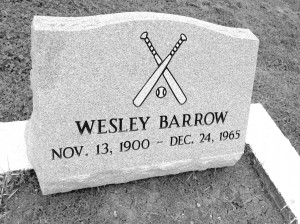Negro League’s baseball legend gets proper tombstone
4th May 2015 · 0 Comments
By Ryan Whirty
Contributing Writer
Paul Lewis wouldn’t have missed it for the world.
Despite driving winds and pounding rain that blew the attendees umbrellas inside-out and soaked their shoes to the socks, the 90-plus-year-old Lewis plowed his walker through grassy puddles at New Hope Baptist Church Cemetery in Gretna Saturday afternoon, April 25, to pay his respects to Wesley Barrow, a New Orleans Negro Leagues baseball legend who died nearly 50 years ago.
After suffering a fatal stroke on Christmas Eve 1965, Barrow — after whom the refurbished stadium at Pontchartrain Park is now named — was buried in an unmarked grave at New Hope despite influencing and shaping the characters of hundreds, if not thousands, of young African-American men (and a few women) for four decades.
But a grassroots movement led by Gretna City Councilman Milton Crosby helped raise enough funds to purchase a burial stone for the great Barrow, and on April 25 a small group of hardy individuals — including Lewis, who played for Barrow on the New Orleans Black Pelicans — gathered around the spruced-up burial spot to pay their respects to the man and the legend.
The most impressive presentation was given by Lewis, who forged ahead in the rainstorm despite his advancing years and told the clustered well-wishers how much of an impact Barrow had on his life.
“It was real beautiful,” Lewis said of the ceremony despite the brutal weather that didn’t deter the attendees. “It was nice. It couldn’t have been better.”
“He meant a lot to me,” Lewis added of the manager who earned the honored moniker of “the Skipper.” “He was a real impressive fellow. I learned a lot from him.”
The ceremony last Saturday also drew Rodney Page, who donated several hundred dollars toward purchasing the grave marker, from his home in Austin, Texas. Page is the youngest offspring of the late Allen Page, a longtime sports promoter, owner, executive and entrepreneur in the NOLA area, and he was another man who, in his youth, played ball under Barrow.
During the April 25 ceremony at New Hope Cemetery, Rodney Page regaled the group with funny and touching tributes to Barrow. One of Page’s favorite stories came when, as a teen, Page threw out a player at home on the fly from the outfield. As Page retold at the ceremony, he had been proud of what he thought was a stellar play. However, Barrow chastised the young Page by barking, “Little Page! Hit the cutoff man!”
“The ceremony is an occasion to honor and celebrate the life and memory of Wesley Barrow, a New Orleans-area Negro League baseball legend,” Page said in a press release before the event. “In addition, it offers a sacred moment to ensure him dignity in death. May time never diminish his worth, significance or memory, and may his soul and spirit always sense and feel our respect and remembrance.”
Also in attendance at the dedication was Ron Swoboda, a former Major Leaguer and member of the 1969 World Series champion New York Mets who now works as the color commentator for the Triple-A New Orleans Zephyrs’ radio broadcasts.
During his own career in America’s pastime, Swoboda has encountered and become friends with several former Negro League players and current scholars of African-American baseball, so he felt obliged to be present April 25 to recognize Wesley Barrow.
With rain splattering his umbrella, Swoboda told the assembled crowd of the importance of the Negro Leagues to baseball history and the lessons the modern hardball world can learn from Negro League players and managers like Barrow, Lewis and others.
On the day after the ceremony, Swoboda sat in the broadcast booth at Zephyrs Stadium before a Z’s game against the Nashville Sounds and reflected on why he decided to brave the previous day’s nasty weather to honor Barrow.
“I really thought what [the organizers] were doing was so appropriate,” Swoboda said. “It bothered me that a man as important as Wesley Barrow was to baseball in this city, a man with a stadium named after him, was laying in an unmarked grave.
“What Mr. Crosby and Mr. Page did was a great thing,” he added.
Wesley Barrow began his career as a semi-pro and professional baseball player in the 1920s and soon realized his greatest ability and true calling was as a manager and mentor to other players.
Over his four decades in the game, Barrow managed not only a slew of local NOLA squads like the Algiers Giants, New Orleans Creoles and New Orleans Black Pelicans, but also teams at the top levels of national African-American baseball like the Baltimore Elite Giants, Harlem Globetrotters, Raleigh Tigers and the Portland Rosebuds.
He also served as a representative of various New Orleans-area teams at meetings of national-level leagues and circuits.
As a result of all Barrow’s contributions to the American game, Gretna Councilman Crosby said, the local baseball icon deserved to be given the dignity in death that he had been denied for so long.
And even though attendance at Saturday’s grave marker dedication ceremony was limited by the thunderstorm, Crosby said the event was indeed a fitting tribute.
“It went really well,” he said. “I talked to other people on the City Council, and they said what we did was great, that it was good what we did. Everybody was satisfied with it.”
This article originally published in the May 4, 2015 print edition of The Louisiana Weekly newspaper.




